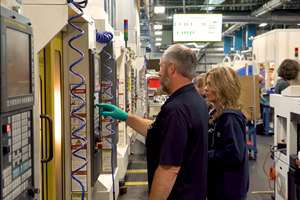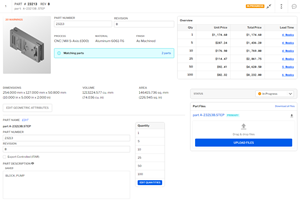AI Makes Shop Networks Count
AI assistance in drawing insights from data could help CNC machine shops and additive manufacturing operations move beyond machine monitoring.
Share





Machine monitoring is not enough to make a shop “smart.”
It can certainly make one smarter. However, even with the deepest utilization metrics and most comprehensive, real-time dashboard displays, the intelligence required to improve is mostly human.
What if there was another intelligence working to derive insights from shopfloor data—a computerized assistant that thinks faster than any human and never makes mistakes, gets tired or lets emotion interfere with its recommendations? FactoryOS, a cloud-based, enterprise-wide “operating system” from software developer Oqton, uses artificial intelligence (AI) to provide just that. “You can almost think of it as a Google Maps for manufacturing,” says Ben Schrauwen, co-founder and CEO. “Instead of suggesting a faster route, the system provides different options for manufacturing a part.”
So far, the system is at work only in additive manufacturing facilities, but Oqton sees great promise for CNC machine shops as well. Consider the process of fitting a newly quoted part into a busy shop’s schedule. Assuming the shop has the means to network and monitor its equipment, it has access to deeper intelligence on its own operation than ever before. Masses of data, from historic performance and costing information to simulation-based predictions of future outcomes, make scheduling easier—or at least, that’s supposed to be the case. The reality is that information takes time to process, and decisions must be made quickly. AI can help by narrowing tough choices in advance. In this case, FactoryOS might suggest different sequences of operations or workstations based on decision-makers’ priorities and past outcomes for similar work.
The system runs in a web browser. AI works in the background to feed customizable modules that present information relevant only to particular operational roles (accounting, scheduling, etc.). As an open-source system built to comply with open standards, FactoryOS interfaces with any physical or digital asset a manufacturer might employ, from machine tool CNCs to CAD/CAM and enterprise resource planning (ERP) systems to machine monitoring software. The longer the AI works, the better the system’s virtual model of what “normal” looks like, whether that applies to an individual machine or process, the entire shop or operations across multiple facilities. The better the virtual model, the better the system’s ability to detect potential problems, actual problems and opportunities for improvement. Pop-up windows notify the user of deviations (or trends toward deviations) from the norm and offer advice about how best to respond.
For instance, on the level of the individual machine tool, an anomaly might prompt FactoryOS to ask if a new alarm condition should be created. “Over time, the AI models how a machine performs when it is well maintained,” Mr. Schrauwen explains. “It will observe if, say, vibration or motor currents for specific types of motion trend higher than expected. These kinds of things are much harder to detect with a standard machine-monitoring dashboard solution.”
Say an experienced machinist makes a shopfloor speed or feed adjustment. Thanks to the MTConnect open communications standard, FactoryOS can take note of the process change, track the impact on machining time, tool life or other variables, and compare the results to similar work from the past. If the system deems the new parameters worth incorporating as standard, it generates a pop-up explaining why and asking for approval before implementing the fix in CAM. “It is always an advisor first, Mr. Schrauwen says. “It doesn’t just take over.”
“It is always an advisor first, Mr. Schrauwen says. “It doesn’t just take over.”
Much of the software’s automation applies to areas outside manufacturers’ control in the first place. A good example—and a key future target—is CAM postprocessors, which he calls “the sand between the gears slowing down the entire industry.”
Desire to eliminate this so-called sand is one reason why Oqton will not sell the software standalone, he says. It plans to bundle it with machine tool purchases by partnering with major builders. With precise digital replications of specific machine models, FactoryOS can provide a more transparent link between CAM software and machine tool CNC. Posts will become purposeless because there will be no need to translate motion written for, say, a five-axis machine to G-code for a specific variety of five-axis machine, Mr. Schrauwen says. Potential results include collision-free G code without simulation, more efficient quoting due to more accurate CAM cycle time estimates, and more efficient tool paths.
The company isn’t there yet. Partnerships are still being formed. However, the system is already at work in additive manufacturing, and the results so far are promising. One user 3D-prints implants, crowns bridges and other dental components at multiple facilities. “Our AI analyzes the part geometry, correlates to the success rates of similar parts, and gives a price,” Mr. Schrauwen says. “Then helps with all kinds of decisions—the printing orientation, the support structure, how to combine parts on the build plate—all based on what has worked well in the past. If something unexpected happens, it learns.”
Related Content
Shop Quotes Smarter, Works Harder with Machine Monitoring
Temco first installed MT-LINKi to optimize quoting. Now, the software helps the shop optimize its machines — and machine purchases.
Read MoreProtecting Your Automation Investments
Shops need to look at their people, processes and technology to get the most of out their automation systems.
Read MoreReinventing a Precision Shop With a Data-Driven Mindset
When this machine shop lost 90% of its business within three months, a reinvention was in order. Here's how it survived after quickly falling on hard times.
Read MoreGive Job Shop Digitalization a Customer Focus
Implementing the integrated digital technologies and automation that enhance the customer's experience should be a priority for job shops and contract manufacturers.
Read MoreRead Next
5 Rules of Thumb for Buying CNC Machine Tools
Use these tips to carefully plan your machine tool purchases and to avoid regretting your decision later.
Read MoreSetting Up the Building Blocks for a Digital Factory
Woodward Inc. spent over a year developing an API to connect machines to its digital factory. Caron Engineering’s MiConnect has cut most of this process while also granting the shop greater access to machine information.
Read MoreRegistration Now Open for the Precision Machining Technology Show (PMTS) 2025
The precision machining industry’s premier event returns to Cleveland, OH, April 1-3.
Read More






























